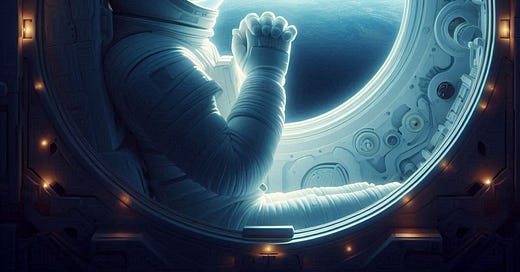In the borderland between surrender and hope lies a special kind of openness. When we release control, when we've exhausted our resources and reached the limits of our ability and problem-solving capacity, something else emerges.
What religious traditions call prayer can, in a secular society, be understood as a form of focused solution-oriented meditation, or in machine language, an evidence-based intervention. We consciously adopt a position of not-knowing toward ourselves - an openness that paradoxically can activate our deepest human resources.
The 2013 film Gravity captures this moment perfectly (spoiler alert). Sandra Bullock plays astronaut Dr. Ryan Stone who, after a disaster in space, has lost her colleague Matt Kowalski (George Clooney) and finds herself alone, floating in space with oxygen and hope dwindling. In one of the film's most memorable scenes, when Ryan is close to giving up entirely in the space capsule, she hallucinates that Matt returns. In this dreamlike sequence, Matt gives her the crucial insight about how to use the landing parachutes to return to Earth.
This scene is a powerful metaphor for what can happen when we dare to loosen our desperate grip on control and solutions. In social work, we often encounter situations where formalized methods, checklists, and evidence-based manuals reach their limit. It's then, in the space between human and machine, that we sometimes need to embrace a different kind of openness - through a path of not-knowing.
Prayer, whether directed toward a deity or our own inner being, represents an approach where we admit we don't have all the answers. This stance of openness - the not-knowing state - creates a space where new insights can emerge, where our subconscious resources can activate, and where new paths suddenly become visible.
In an era of increasing formalization and systematization, it's worth remembering this paradoxical power: sometimes it's precisely when we let go of knowing that the deepest wisdom can emerge.
A reflection on social work's ultimate resource—the human being's inherent ability to surprise oneself.





